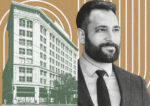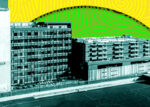San Francisco, with what has been dubbed the most empty downtown in America, has hatched a plan to turn vacant offices into homes and fill empty stores in Union Square.
Mayor London Breed and Board of Supervisors President Aaron Peskin have launched legislation to relax requirements for Downtown office-to-housing conversions to save developers both time and money, the San Francisco Chronicle reported.
The proposed ordinance would also loosen rules around Union Square to help the struggling shopping district become less reliant on large retail stores.
Breed and Peskin aim to slash red tape and help jumpstart projects that could bring new life to Downtown, which has seen an exodus of office workers and visitors during the pandemic era of remote work.
It’s an acknowledgment that economic shifts ushered in by the coronavirus are likely permanent. San Francisco officials must now diversify a city center limited to mostly offices, hotels, shops and restaurants.
City Hall has major financial incentives to fix Downtown, given the city faces a $728 million two-year deficit driven by lower expectations for business and commercial property tax revenue.
Downtown’s offices grow emptier by the day. The city’s office vacancy rate was 29.4 percent in the first quarter, according to preliminary figures from CBRE, a 1.8 percent jump from late last year.
Breed said any attempt to build new housing or fill empty stores “shouldn’t be something that requires granting exceptions through lengthy paperwork and exhaustive public hearings.
“We need to make the process easier for getting our buildings active and full,” the mayor said.
The Breed/Peskin ordinance would eliminate city requirements that Downtown office-to-housing conversions have some space reserved for rear yards, have a certain percentage of two- and three-bedroom units and have a hearing before the Planning Commission.
Those changes alone could speed up a conversion project by 18 months, Planning Director Rich Hillis told the Chronicle
While Downtown office towers could be turned into thousands of homes — a recent study estimated that 12 buildings could produce 2,700 units — few projects are in the pipeline.
The city’s first post-pandemic office-to-housing proposal is the historic Warfield Building at 988 Market Street, which would benefit from the proposed changes. A conversion of an old office building in Lower Nob Hill also could be in the works.
In Union Square, Breed and Peskin aim to build on a strategic plan by the Union Square Alliance, which found zoning restricts upper floors to retail businesses. Because retailers don’t want to use second or third floors, it’s hard for landlords to fill storefront vacancies.
Union Square’s retail vacancy rate last fall hit 35 percent, nearly three times the rate in 2019. The rate is now closer to 27 percent, said Marisa Rodriguez, CEO of the Union Square Alliance.
Breed and Peskin want to ease zoning rules to allow the upper stories to be filled by small offices, service sector businesses and more.
The legislation would also let ground floors around Union Square host entertainment businesses and co-working cafes in addition to the larger retailers already sanctioned there.
The legislation would allow more variety in temporary pop-up businesses inside vacant storefronts, while allowing city staff to review minor changes to historic buildings without a full-fledged public hearing.
Peskin said the legislation was only “half the battle.” The other half, he said, will require city departments to collaborate with developers to take advantage of the new rules, ensuring that projects are built in a timely manner.
“We can pass all the legislation we want, but if (the Department of Building Inspection) and various permitting agencies move at the speed of molasses, then we’re still in trouble,” Peskin said.
— Dana Bartholomew
Read more



